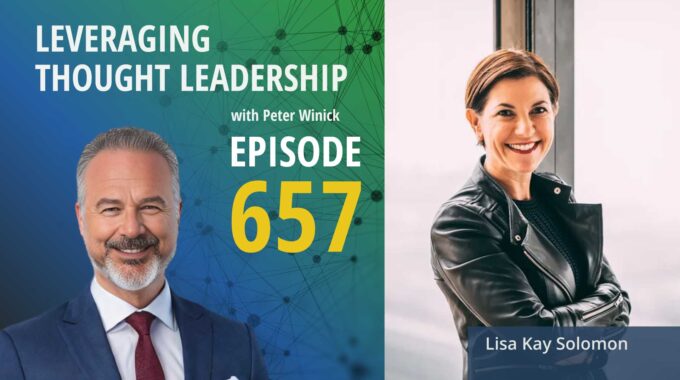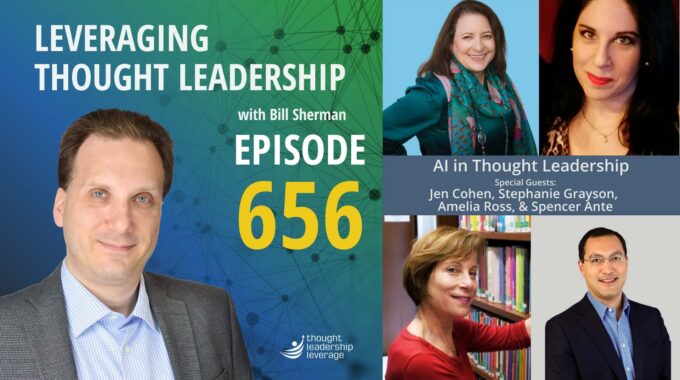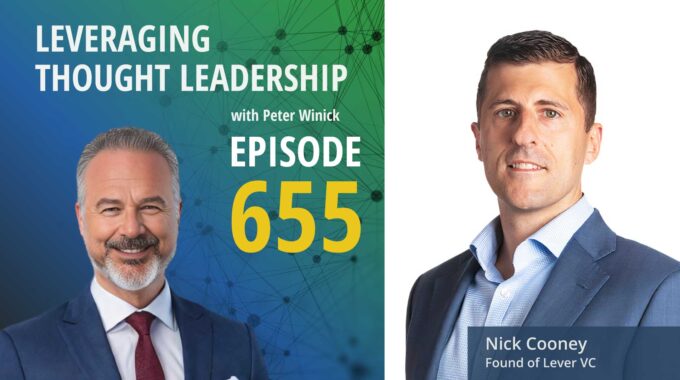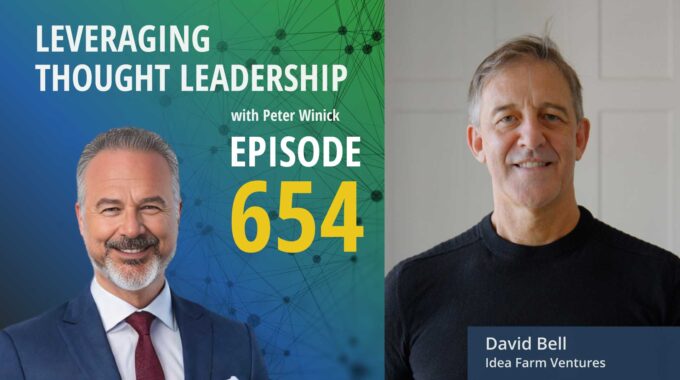How design thinking and futures literacy can transform your leadership This episode explores how leaders…
Breaking Into Thought Leadership Speakership | Merit Kahn
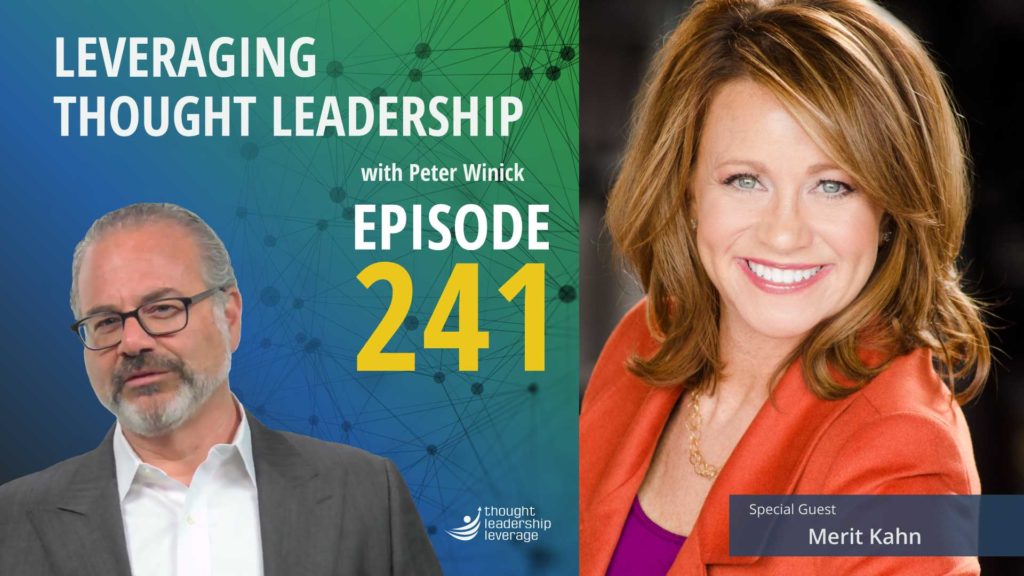
Marketing your thought leadership speaking engagement for maximum returns.
An interview with Merit Kahn about how to measure thought leadership success against audience interest, as well as creating a system to generate follow up leads after speaking engagements.
We interviewed Merit Kahn, entrepreneur, educator and entertainer. She’s the Founder of Merit-based Business, author of Myth Shift: Challenging The Truths That Sabotage Success and creator of The Merit Method: Sales Mastery for Life program, and she’s here to talk to us about her fascinating career and her shift into thought leadership speakership.
Merit explains how she started her sales training business after leaving a radio station as an ad salesperson. She used free speaking as a marketing tool for her sales program but loved speaking so much she started to explore how to make that the business. Merit and Peter discuss the tools used for training and which tools fall into the professional or personal development bucket. They also discuss the reasons why many methods that were once considered personal are a hard part of the business world now. Merit talks about why it is important to have systems in place to ensure every speaking engagement has the highest possibility of a follow-up conversation and why you can’t leave that responsibility to the audience.
Four Key Takeaways from the Interview:
- How did a stand-up comedienne and cheerleader become a wildly successful CEO, and break into the world of thought leadership speakership?
- Why you should never worry about giving away some of your thought leadership speakership for free.
- Why thought leaders need to have emotional intelligence and why it is now a business skill.
- Why you need a strong system to nurture leads, clients, and other thought leadership speakership opportunities if you’re going to find success.
Are you working on breaking into thought leadership speakership? Do you have your systems and methodologies in place to advance your thought leadership speaking? Are you needing help finding opportunities in today’s new normal? We can help! Contact Thought Leadership Leverage for assistance.
Transcript
Peter Welcome, welcome, welcome. This is Peter Winick. I’m the founder and CEO of Thought Leadership Leverage. And you’re joining us on the podcast, which is Leveraging Thought Leadership. Today, my guest is Merit Kahn, who has a very long bio that I’m going to condense for the sake of time here. She’s the founder of Merit-Based Business. She’s the author of Myth Shift Challenging the Truth to Sabotage Success. And she’s the creator of The Married Myth, The Merit Method, SALES Mastery. She’s been a speaker for quite some time. She’s going to CSP designation, which if you know anything about the speaking world, that’s sort of a big deal, sort of like an MBA speaking. And of course, to unwind, she performed stand up comedy. So welcome aboard. How are you?
Merit Kahn Yeah, I’m doing great. Yeah, I’ll hold it up.
Peter There we go. So how does it let me ask you this question. So in many careers and many parts, so many things that people do, there’s sort of a logical or cause I linear way to get there. Right. So if you want to be a teacher, you probably should like kids. Right. You take education classes and then you student teach and then voila, you’re a teacher. That being said, how the heck did you get here? How did this happen?
Merit Kahn I think it was never really a question of what was I going to do in my life? It was more a question of what was I going to sell in my life and how was I going to perform. So I think from a very young age, I was on as I was performing, you know, whether it was on the cheerleading, you know, on the football field as a cheerleader or on a stage as a show. But yeah, I mean, my dad sold advertising. My mom sold her real estate. My grandparents had a car sale. Yes, a lot. And so, it’s just it’s just around me. And I just always gravitated towards helping people grow and learn. And so I was always driven at a very young age to, you know, teach speech sales and motivate people. And that’s kind of how I got here.
Peter Cool. So, tell us a bit about all the different pieces. So there is, you know, I could introduce you as merit speaker, I can introduce you is married the author, I can introduce you married the business owner. How does it all thread together through the thought leadership? Because the common DNA beside you, it’s the thought leadership and the content that is at the core of the business. So how does that all connect?
Merit Kahn You know, I think it really all connects through the deep study and the work and the interests that I’ve always had and personal and professional development. I think probably, you know, between walking on coals at a Tony Robbins seminar when I was 19 and landmark education things and some things that I’ve done, I always, you know, that kind of expanded my mind to what was possible. And then I was in sales myself. I was there. I still am. But I was in video advertising sales. And it really quickly to be a sales manager. And in that role, I was noticing that I was helping other people, not just sell our radio station and get advertisers, but also know kind of get to what they wanted to do in their lives, like what your picture goals. And where radio station chopping block we were being sold. And that kind of upsets the apple cart in a lot of ways. And so, I had a choice. It was one of those choice points. You know, do you want to just work on another radio station doing what you’re doing or is there another path? And I looked around and I didn’t see many women in that industry at that time. And I don’t think it’s changed that it really elevated to it and also had some life balance. So, I thought it was time for me to leave. And actually that’s when I started the sales training business in nineteen ninety eight. And it was in that I would go out and I would speak for free to market my sales training services.
Peter And then when just speaking the speaking was marketing.
Merit Kahn Oh yeah.
Peter And the product was the sales development.
Merit Kahn Exactly.
Peter Got it. OK.
Merit Kahn Somebody said well you know, oh I’d love to have you come and speak to our group, but I don’t know if we can afford you. And I’m thinking, how do you not afford free right now? And I didn’t say it. I just.
Peter Yeah.
Merit Kahn Let her talk. And she said I said, well, you know, I’d be happy to help you. What do you typically pay your speakers? And she says, I don’t know. I mean, we could probably swing a thousand dollars and I’m like, OK. And I accepted that. And we had worked out an agreement. But I was a marketing opportunity. So then I’m getting paid for the marketing that I was still doing. And I thought, this is the greatest thing ever. But I’ve noticed very quickly that I liked the speaking part of it. Yes. Better than any other aspect of the business. And that’s what we pursued. My certified speaking professional and looking at how is this a business.
Peter So when want get back to the speaking in a minute. Is it some questions there? But you mentioned, you know, your passion about personal development and professional development. You mentioned Landmark, which used to be asked, and Tony Robbins and then professional development. I’ve seen that a lot with my clients where there’s a level of self awareness, there’s a level of lifelong learning. There’s a level of introspection that comes more from the personal development universe than the professional development universe. But what I’ve seen over the last 10 years, if you were to look at, let’s say, the top 20 business bestsellers of the last 20 years, I would argue that half of them or more may have been pushed into the personal development bucket if they were marketed differently for some reason. So the stuff that’s moving into professional emotional intelligence, listening skills, introspection, etc. what are your thought like? Where’s the line? Is it changing and how do those two. Where’s the line between church and state? You don’t wanna go with that? Yeah, I could be very. There’s the line. We don’t talk about feelings. We don’t know.
Merit Kahn Now, I think that’s a very insightful question, actually. And you mentioned emotional intelligence and I got certified an emotional intelligence. Was back in 2009. And I did that because I had to tell you just a quick story. So, I had two guys in my training class, Steven and Daniel. They both worked for the same company. They were both hired at the same time. They sold the same products in the same market place at the same price points. They kind of looked alike. I mean, like same same, same, same, same.
Peter This sounds like an AP test in marketing.
Merit Kahn It really turned out to be that and accept that, you know, and as they were learning the same sales techniques from the same exact trainer in the same class, I saw Steven really apply what he was learning and get much better results than Daniel. And it frustrated me as a trainer because I thought, well, I can’t take credit for Stephen’s success if I don’t also take responsibility for Daniel shortcoming. Right. And I that’s what sparked my search for what is it really? Because it’s got to be something more than the techniques that I’m teaching you. So, plan we put together. And when I studied emotional intelligence and I had them do the assessment, that’s where I saw the big the big gaps. Right. There was a marked difference in Steven and Daniel in terms of their ability, their level of self-regard, their level of optimism, assertiveness, interpersonal relationships. And many of the things that, you know, all of the things there are 15 attributes we assess. But there’s drug sales. And so, it was looking at that. So, I kind of you know, at first when I would say my early years of sales training, I really only had technique to teach to. Right. Once I understood the emotional intelligence, it was like there were these gaps. And no matter what skills I taught on top, that if they would fall through the gaps, if there were, you know, if self-regard was low or assertiveness was lowered, empathy. So, once I could help people through emotional intelligence like close those gaps, then the skills that I was teaching were right there, a top of mind. They knew I knew how to address Peak so that they would use it based on the profile they had. So, I think more so now than ever. We don’t look at emotional intelligence anymore like a soft skill.
Peter Right. Right.
Peter People understand it’s hard core business stuff right now. Yeah, that’s silly. I mean, you know, depending on when your audience is listening to this podcast, I mean, right now we’re in the midst of the Coronavirus. Do you know pandemic? And it is more important than ever to understand your emotional intelligence. None of nothing else matters right now. And then times of any crisis, then your ability to stay calm, to be able to be open to the ideas and the new solutions and the creative ways you can solve problems that you need more so now than you than you may have even needed. You know, in our case.
Peter Right. Right.
Merit Kahn So I think the blending of those you know.
Peter What I’ve seen is I think I think the trend has been. On the personal development side, it’s all, you know. Anything goes plus or minus, right? Not anything, but almost anything goes at walking on coals. You breakthroughs from your childhood and all that sort of stuff. And I think there’s things that keep crossing over into sort of the corporate mainstream, like meditation, like mindfulness, like work life. But, you know, all those things keep creeping over. And it’s always the really evolves companies typically on the West Coast that start and then it sort of trickles down and says, oh, you know, okay, maybe meditation is a scary world. Let’s call it mindfulness. Michael, this sounds like a good word. Guess what? Right. So that’s that that’s why I see it going. And there will always be a line in terms of what is appropriate on the personal side and the professional side. But we could learn from the personal development folks as well. I want to comment on something that you said earlier where you had this sort of the light bulb moment of somebody actually offered to pay you to speak, which is, I think, what many speakers have had that light bulb moment, meaning wait, that people get might need to do that for forty five. And they get that. Well I want some of that. Right. I still think that. Well it’s probably changing in this post Covid universe. But you know, there’s a place for paid speaking and there’s a place for not. And the reality is if you’re a speaker you’ve got to have the systems and processes and methodologies and objectives in place to say one of the outcomes of me delivering this great speech is not just the smiley sheets and a standing ovation, all that sort of stuff, but it should be the beginning of a relationship with the client, not the end all and be all. But you’ve got to have the product suite to support that. And then if you do, there will be times that you’ll speak for free. And by the way, sometimes when you speak of free, you can make ten times what you make. Speaking for, quote, money. So, could you touch on sort of how you put the suite of services together, how you connected to speaking as sort of the tip of the spear?
Merit Kahn There’s a little bit of a painful question, actually, because I haven’t always been good at that. I always make the distinction between sales and marketing like so marketing is everything that happens before a conversation. And once you’re in the conversation, you’re in a sales, you’re in the sales world. And I’ve seen people go backwards. Right. They’ll say something in a conversation with somebody and they’ll say, well, have you checked out my website or look at my Web site like you’re going backwards? Don’t do that.
Peter Right, right. Right.
Merit Kahn I will always prided myself on, you know, if I can get a conversation with you. I’m a sales expert. I know exactly what to do. And that’s always kind of fallen a little short in the marketing side. Happily was the last summer. I really took a deep dove into getting all my systems and tools and processes back end up to speed. And I mean, I couldn’t have known the panoramic situation that we’re in and how the game would change for speakers. But say I’m so grateful that I took the time to step back and get those systems and tools in place, because literally before we jumped on this podcast, I was with my marketing guy in my head. You know, Speaker Flo’s CRM and get those tools together and working on things. So it’s critically important. Now, for example, yesterday we did a webinar and there were more than 700 people registered for that from 51 countries. And it was a free conversation. But I was set up so that it could pay off later. And this is the mistake that I made myself. Not that long ago, I was doing it all the time right now. And we need to change this immediately. So because I had. Now I have that last rate, 700 new contacts. As soon as the webinar was over, they got a link to a survey. And in that survey, I asked them questions about how they’re feeling about the market.
Peter Sure. Yeah.
Merit Kahn But there were two questions that I asked that I’m seeding future current show business. So one of those questions was, would you appreciate a phone call with Merit to discuss how we can get you through this situation and keep you open for business? More than several people say, I would love a conversation. And so now I have 10 people as they’ll talk to you. Right. The second question was when it’s safe for us to meet in large groups and travel again, would you be open to inviting Merritt to speak to your group? I had 12 people say I only had I didn’t have as many surveys. We had some glitches with the link. But anyway. But I had at least 12 people that said, yes, I would be open to having that conversation. Well, that’s well know.
Peter Right. So let’s say typically out of 12 prospects, you get you know, if we were in the world, you get three or four speaking gigs out of that. And then you get a handful of other clients. I think. The struggle most people have not most but many, many have is why get up there, do a great webinar and give great you kickass content and then people fall in love with me and, you know, rainbows and unicorns. The burden and the onus is on you to develop the systems and methodologies and process to say, great. You put out all this good will. You gave all this. I mean, they got a free sample of what a keynote might be like by seeing you. They liked it, but don’t put the burden on them to say let them go. They could Google me and then they can email me and then they could do it like they do. They don’t want to do that. They’re going to go back to their desk desks. They have 42 emails. Right. So, putting that system in place and I also imagine you’re adding to your database. They see your newsletter and you will have some short term benefits, a mid-term benefit and some long term benefit. And what I love about conversations like these is sometimes you have a conversation two years later and say, you know what? One webinar I did actually contract 400 that 400000 up the business over the last three years that came from that. But you’re got to have systems in place.
Merit Kahn Exactly. And if you don’t have that back in system in place to nurture that lead over time, it’s rare, especially right now. You know, people are in two camps right now. Right. They’re either they’re either like hunkering down and they’re not going to deal with anything until later or they’ve got more time to be looking at your. And watching your webinars, because they’re just that home kind of trying to figure out how do I do? How do I do this work thing and how do I reinvent, you know, whatever I’m doing. So, I think it’s more important than ever. If you are a thought leader and your message is important, then it is your responsibility to get it out there in an appropriate way, make appropriate offers to people right now. Let them know how you can serve them. I have in fact, yesterday after the webinar, I was busy adding things to my own Web site. I put up a free resources page. There will be no sales pitch on it. And I’m very clear about that.
Peter Yep. Yep.
Merit Kahn Go to when you want to watch the recordings or. And I’m planning to link other things like I’ll put the link to this package. People to have all the free resources, whether they come from me or some other amazing thought leaders that can help people through this crisis.
Peter And the more you can give away of your work, the more that comes back. Is there. There is an argument that some make, which I do not agree with on any level, that I can’t give it all away because then they won’t pay for it. And it’s actually the opposite. The more that you give away, the more their, you know, their exposure with, the more they’re comfortable with it, the more they’re listening to you, they’re hearing you. They’re actually more likely to then buy from you.
Merit Kahn Absolutely right. Because that tab on my website is right next to, you know, compels me to speak through Covid 19. Right. There are paid pay to play offers on that page as well. Sure. That’s important. And as evidence from the people that responded from the webinar yesterday, there were people that already scheduled time on my calendar to talk about how I can help them more. They saw something from themselves because I gave away good yet relevant -.
Peter And some of those may be tire kickers. But that’s life in the fast lane, right. And some of them may be good conversations for now and some may be relationships that you’re building for, you know, for the future. Some cool ideas. We start to wrap up any. No pressure, but any final words of wisdom that could be life altering to a someone that’s out there that’s aspiring to be where you are at some point.
Merit Kahn No pressure at all. Always. I always have something to say. Right. Right. Out, out my head. I would say and you know it now more than ever. It’s on my mind. And it will be as relevant once we’re past this Covid experience as well. But I think what are the magic phrases that I encourage people in any level of this business? Is that it is. Are you open to write? So when working with sales people or business owners or entrepreneurs and they’re, you know, thinking like it can’t get any better than it is. I might say, you know, have you already decided that it can’t get any better? Or are you open to a discussion about new possibility? Right. Q It’s a great question. I mean, some solutions and I think that that that question above anything else that I teach or, you know, do for people that questions a game changer for them because it really it it opens that door for, OK, once you see another possibility, then you’re open to go to the systems and tools and the experts on your team to make it happen. But if you don’t see it in the first place, nothing is happening.
Peter And you almost can’t say you’re not because it’s an implication of no, I’m the most closed minded human unless realistically, hey, we just signed this big contract with our sales training company. We have these commitments and I can’t you know, but ninety eight percent of the time by saying, no, I’m not open to that. You don’t want to hear that coming out of your own mouth. But my idiotic statement. Well, this has been awesome. I appreciate your time. I appreciate you sharing your journey with us. And this was a lot of fun. Thank you so much.
Merit Kahn My pleasure. Thanks for having me.
Peter Cool.


